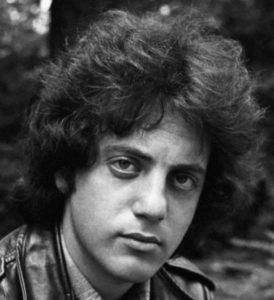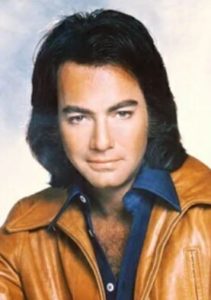Piano Man
 William Martin Joel (b. 1949) was born in New York to an immigrant Jewish family with German and English heritage. Both of his parents were music enthusiasts, and compelled little Billy to start piano lessons at age 4. Often picked on as a teen, he decided to take up boxing and soon became an amateur champion. He only retired from boxing after seriously breaking his nose. To support his impoverished family, Joel played piano at a bar most nights. Because of this, he missed many exams and failed to graduate from high school. He decided to pursue a music career instead, inspired by the success of The Beatles. Joel first played for a number of bands, including the Echoes, the Emeralds, the Lost Souls, the Hassles, and Attila. He recorded his first solo album in 1970, but it did not do well. He went on tour and at one point opened for The Beach Boys. In 1972, Joel signed with Columbia Records and moved to LA. The first album was Piano Man, with its eponymous hit song making Joel famous. (“Piano Man” was later ranked among the 500 Greatest Songs of All Time by Rolling Stone.) His 1977 album The Stranger became Columbia Records’ all-time bestseller. In 1987, Joel performed in the Soviet Union, one of the first Americans to do so. All in all, Joel produced 13 albums, winning 5 Grammy Awards (out of 23 nominations) and selling over 160 million records worldwide. He is America’s fourth-best-selling solo artist. He was inducted into the Rock and Roll Hall of Fame in 1999, and has a star on the Hollywood Walk of Fame. He has also been awarded 7 honourary degrees. Aside from music, Joel is passionate about boating and runs the Long Island Boat Company as a side-business. Despite nearing his 73rd birthday, he is still performing.
William Martin Joel (b. 1949) was born in New York to an immigrant Jewish family with German and English heritage. Both of his parents were music enthusiasts, and compelled little Billy to start piano lessons at age 4. Often picked on as a teen, he decided to take up boxing and soon became an amateur champion. He only retired from boxing after seriously breaking his nose. To support his impoverished family, Joel played piano at a bar most nights. Because of this, he missed many exams and failed to graduate from high school. He decided to pursue a music career instead, inspired by the success of The Beatles. Joel first played for a number of bands, including the Echoes, the Emeralds, the Lost Souls, the Hassles, and Attila. He recorded his first solo album in 1970, but it did not do well. He went on tour and at one point opened for The Beach Boys. In 1972, Joel signed with Columbia Records and moved to LA. The first album was Piano Man, with its eponymous hit song making Joel famous. (“Piano Man” was later ranked among the 500 Greatest Songs of All Time by Rolling Stone.) His 1977 album The Stranger became Columbia Records’ all-time bestseller. In 1987, Joel performed in the Soviet Union, one of the first Americans to do so. All in all, Joel produced 13 albums, winning 5 Grammy Awards (out of 23 nominations) and selling over 160 million records worldwide. He is America’s fourth-best-selling solo artist. He was inducted into the Rock and Roll Hall of Fame in 1999, and has a star on the Hollywood Walk of Fame. He has also been awarded 7 honourary degrees. Aside from music, Joel is passionate about boating and runs the Long Island Boat Company as a side-business. Despite nearing his 73rd birthday, he is still performing.
Purim Begins Tonight! Chag Sameach!
The Purim Code That Prophesied the Nazi Nuremberg Trials
Purim-themed posts from the Jew of the Week archives: Esther, Mordechai, and Daniel
Words of the Week
I have frequently had cause to comment upon the extraordinary generosity and liberality of the American Jews in their charitable contributions. Indeed, their voluntary contributions exceed that of any other American group, and range from the stinted savings of the poorest workman to the full outpouring of those in more fortunate positions.
– President Herbert Hoover


 Neil Leslie Diamond (b. 1941) was born in Brooklyn to a Jewish family of Russian and Polish heritage. In high school, he sang in the school choir alongside classmate
Neil Leslie Diamond (b. 1941) was born in Brooklyn to a Jewish family of Russian and Polish heritage. In high school, he sang in the school choir alongside classmate